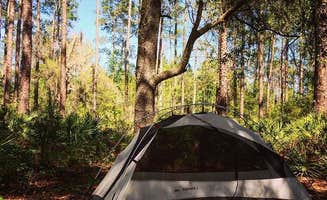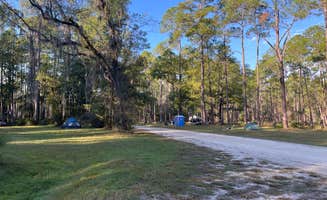Dispersed camping opportunities near Jacksonville, Florida primarily exist in the Osceola National Forest, located about 40-50 miles west of the city. These primitive camping areas provide budget-conscious campers with no-cost or low-cost options throughout the year. Seasonal weather conditions significantly impact access to these sites, with summer bringing frequent thunderstorms that can flood forest roads and create challenging mud conditions for vehicles without high clearance.
What to do
Hiking access: The Florida Trail runs through the Osceola National Forest near 17 Mile Hunt Camp, offering hikers direct access to long-distance trails. "We hiked in a few miles on the Florida Trail, so we had all our water supplies on our person. There's a little pond there that we were purifying water out of with no issue," notes one backpacker who visited the area.
Wildlife viewing: Early mornings provide opportunities to spot deer, wild turkeys, and various bird species. One camper at Cobb Hunt Camp mentioned, "This place is very beautiful way out in the woods," highlighting the natural surroundings that attract wildlife enthusiasts.
Photography: The small ponds found at hunt camps offer reflective water surfaces for sunrise and sunset photography. A visitor to 17 Mile Hunt Camp reported, "We got an amazing spot with a view of the pond," suggesting locations that provide scenic landscape shots.
What campers like
Privacy between sites: Many dispersed sites offer significant space between camping areas. One visitor to 17 Mile Hunt Camp noted, "It had tons of space with space between camp spots. Quiet. Lots of locals during the day but settles down at night."
Digital detox: The limited connectivity creates opportunities for unplugged camping experiences. A camper reported, "Minimal, if any, cell service, so you will be disconnected pretty much," making these sites ideal for those looking to escape technology temporarily.
Affordability: Free camping makes these locations budget-friendly alternatives to commercial campgrounds. A visitor to Cobb Hunt Camp commented, "Free no water or electricity, porta-potties. Most campers stay to themselves and there's room for privacy," highlighting both the cost savings and camping experience.
What you should know
Road conditions: Access roads can deteriorate rapidly after rainfall. "The road is rough getting in," notes one camper, while another advises, "Just make sure to check the ground before you park. Very muddy, could get stuck."
Hunting activity: During hunting seasons, expect increased traffic and occasional gunfire. One camper at 17 Mile Hunt Camp reported, "Heard many shots during the late afternoon when we got there, around 4p. Off and on until it got dark at 6:30p."
Maintenance closures: Site availability can change without notice. Recent visitors to Cobb Hunt Camp found: "Cobb Camp Osceola is closed though the website makes no mention of the closure. There are people camping just beyond the campground without issue."
Tips for camping with families
Ground activities: Bring toys and games that can be enjoyed without playground equipment. A parent who visited reported, "I camped there with my boys in a tent, and they had a blast just playing in the dirt."
Safety awareness: Prepare children for wilderness conditions and wildlife. One camper with a small dog noted safety considerations that would apply to children as well: "We did have to be extra careful with our little dog though because we did get the sense that something could try to eat it since the sites are in the middle of the woods."
Alternative sites: Consider nearby state campgrounds if hunt camp conditions seem too primitive. As one camper at Cobb Hunt Camp mentioned when finding the main area closed, "State campground just down the road," suggesting backup options are available if dispersed camping proves challenging.
Tips from RVers
Site selection: Scout for naturally level spots to minimize setup time. One RVer at 17 Mile Hunt Camp shared, "We ended up loving the site we picked. We were able to pull through instead of backing in, the ground wasn't too muddy so we didn't get stuck, and we didn't even need to level the camper - it was naturally flat."
Water planning: Bring all necessary water as natural sources require purification. A camper noted, "I'm in a travel trailer so I had the chance to take advantage of all the amenities my camper has to offer," implying self-sufficiency with water reserves.
Generator etiquette: Be mindful of noise levels when using generators. One tent camper complained about "having to sleep through a running generator all night," highlighting potential conflicts between different camping styles in these unregulated areas.



